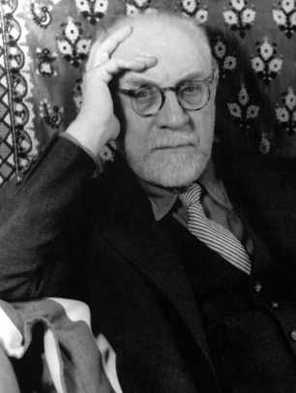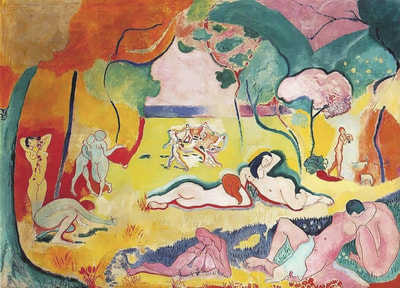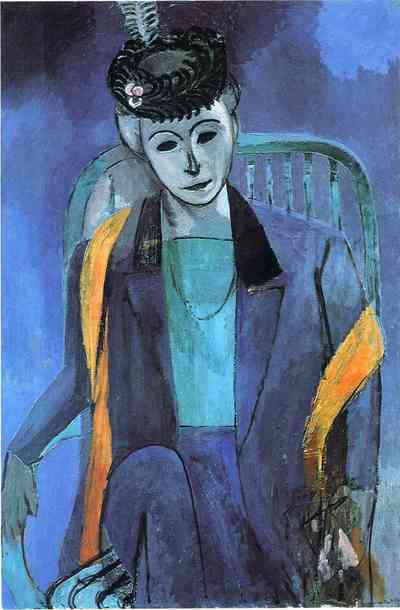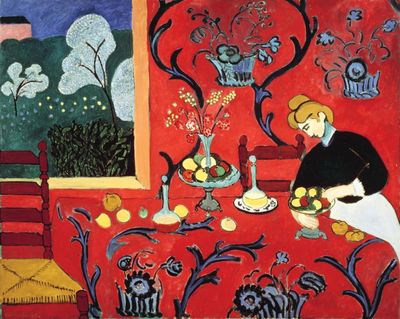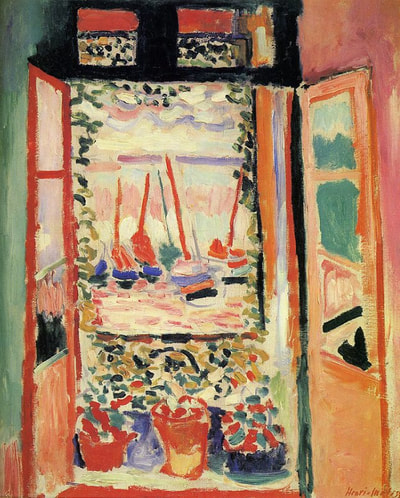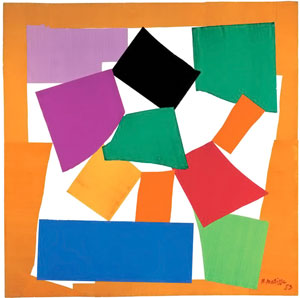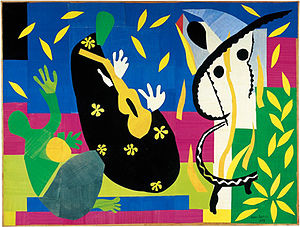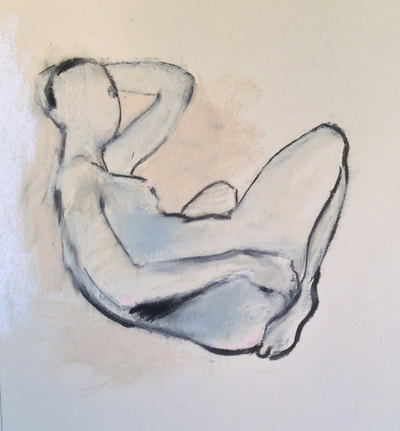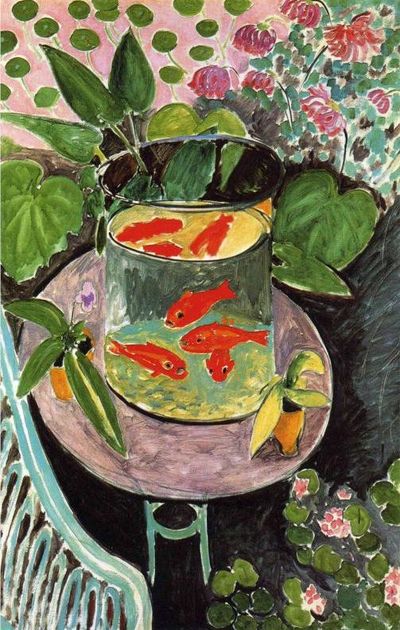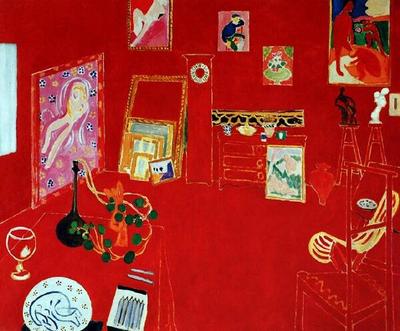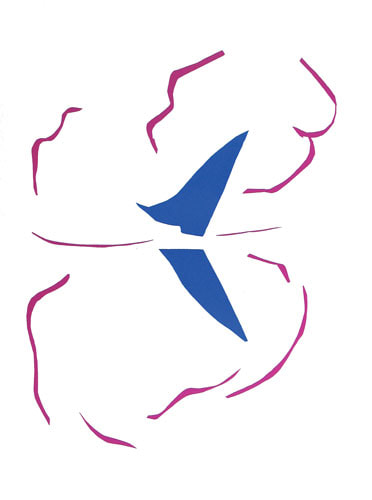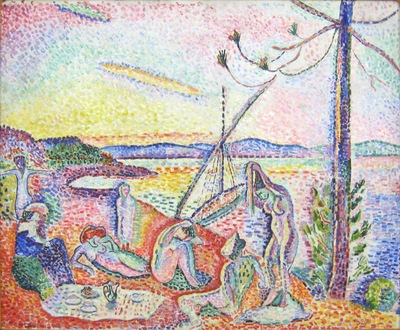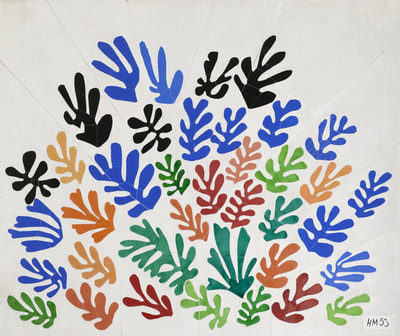Many of the young artists during this period, did work under Gustav Moreau, and created works in his studio. While he encouraged his students to develop their own personal style and voice, Moreau did favor art forms which showcased decorative and exotic styles, which was present in many of the works which came out of his studio. At this studio, Henri Matisse met Charles Camoin, Henri Manguin, and Georges Rouault. At a later date, this group also welcomed Georges Braque, and other artists, who were well known for their unique styles, and art forms they had created, during this time period.
Vibrant colors were a common theme, in the many pieces of art which this group was famous for. They developed a very free style of painting, in where the colors used, represented the images, independent of the actual hue, represented the images which they focused on in their art. In 1905, Henri Matisse, along with Salon d'Automne, Derain, Camoin, and other artists, were showcased at a gallery. Their works were shown around an Italianate, which was created by another artist of the time. Art critic, Gil Blas, was prompted to write "Look! A Donatello among the wild beast!" , which christened the group, and the work they had created for this gallery. Colorism, in a radical and arbitrary form, were behind Fauvism as an art movement. Unlike the styles which appeared after 1910, and the avant garde style, Fauvism wasn't meant to be its own movement, or style, but critics and the general public perceived it as such. The art form, for this reason, ended in around 1907, and following this period, the different artists who were the leaders of the movement, followed their own, divergent paths. Prior to Cubism becoming the next popular movement, even with its lack of distinction as a movement, Fauvism was seen as the most popular movement, and was the most advanced movement of the time, just prior to World War I.
During the 1905 Salon D'Automne, Henri Matisse was seen as a leader of the movement by his peers. He was considered to be the most artistic and most talented of the group, plus the fact that he was the oldest, and most trained artist, made him a figure which others surrounding the movement, looked up to as inspiration and as a leader of the movement. In fact, in 1901, Derrain asked Henri Matisse to visit his parents, and persuade them to believe that painting was a respectable form of work, during this time period. Fauvism was only a limited part of his career, but the unique colors, and distinct style, followed Henri Matisse for the remainder of his career, and throughout the other movements which followed this brief stint in his style and work.
"The courage to return to the purity of means," was later quoted by Matisse, to be the starting point of the Fauvism movement. Matisse's true artistic liberation, in terms of the use of color to render forms and organize spatial planes, came about first through the influence of the French painters Manet, Gauguin and Cezanne and the Dutch artist Van Gogh, whose work Matisse studied closely beginning about 1899. Although others artists like Vlaminck and Dufy focused on the "wild" aspect of this movement, Henri Matisse was more concerned with the free color, which allowed for expression in his work. It allowed for an open, free way to depict the objects which were the central focuses of his work, allowing for a "decorative," style.. To continue reading the full article, please visit https://www.henrimatisse.org Henri Matisse Quotes
“Creativity takes courage. ”
“There are always flowers for those who want to see them.” “I didn't expect to recover from my second operation but since I did, I consider that I'm living on borrowed time. Every day that dawns is a gift to me and I take it in that way. I accept it gratefully without looking beyond it. I completely forget my physical suffering and all the unpleasantness of my present condition and I think only of the joy of seeing the sun rise once more and of being able to work a little bit, even under difficult conditions.” “You must forget all your theories, all your ideas before the subject. What part of these is really your own will be expressed in your expression of the emotion awakened in you by the subject.” “We ought to view ourselves with the same curiosity and openness with which we study a tree, the sky or a thought, because we too are linked to the entire universe. ” “To look at something as though we had never seen it before requires great courage.” “Another word for creativity is courage.” “...for whether we want to or not, we belong to our time and we share in its opinions, its feelings, even its delusions.” “Nothing can be accomplished without love. ” “You study, you learn, but you guard the original naïveté. It has to be within you, as desire for drink is within the drunkard or love is within the lover.” “Exactitude is not truth.” “I don't know whether I believe in God or not. I think, really, I'm some kind of a Buddhist. But the essential thing is to put oneself in a frame of mind which is close to that of prayer.” “To arrive is to be in prison.” “From the moment I held the box of colors in my hands, I knew this was my life. I threw myself into it like a beast that plunges towards the thing it loves.” “I am unable to distinguish between the feeling I have for life and my way of expressing it.” “Derive happiness in oneself from a good day’s work, from illumination the fog that surround” “I am unable to make any distinction between the feeling I get from life and the way I translate that feeling into painting.” “Don’t wait for inspiration. It comes while one is working.” “Whoever wishes to devote himself to painting should begin by cutting out his own tongue” “An artist must never be a prisoner. Prisoner? An artist should never be a prisoner of himself, prisoner of style, prisoner of reputation, prisoner of success, etc” “It has bothered me all my life that I do not paint like everybody else.” “Impressionism is the newspaper of the soul” “Si je crois en Dieu? Oui, quand je travaille. Quand je suis soumis et modeste, je me sens tellement aidé par quelqu'un qui me fait faire des choses qui me surpassent.” “Time extracts various values from a painter's work. When these values are exhausted the pictures are forgotten, and the more a picture has to give, the greater it is.” “The importance of an artist is to be measured by the quantity of new signs which he has introduced to the language of art.” “Instinct must be thwarted just as one prunes the branches of a tree so that it will grow better.” “I do not distinguish between the construction of a book and that of a painting and I always proceed from the simple to the complex." - 1946” “The essential thing is to spring forth, to express the bolt of lightning one senses upon contact with a thing. The function of the artist is not to translate an observation but to express the shock of the object on his nature; the shock, with the original reaction.” “When you're out of willpower, you can call on stubbornness.” “Siempre hay flores para aquellos que desean verlas.” “Don't wait for inspiration. It comes while working.” “El artista comienza con una visión, una operación creativa que requiere un esfuerzo. La creatividad requiere coraje.” “A thimbleful of red is redder than a bucketful.” “Me gustaría recuperar esa frescura de visión que es característica de la extrema juventud, cuando todo el mundo es nuevo para ella.” “Creativity takes courage”
0 Comments
Leave a Reply. |
How to draw like a Master Artist with Step by Step FREE "Online Art Classes and Tutorials." Subscribe below.
More Artists Coming Soon! Stay CONNECTED.
Famous Artists
All
|
